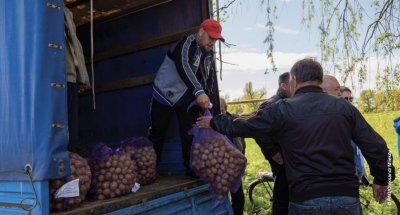Tackling food security risks in the Southern and Eastern Mediterranean

The war in Ukraine is having an enormous impact on global food security. Together, Ukraine and the Russian Federation account for one-third of global cereal exports and about half of the export market for sunflower oil. Global food prices, already steep during the pandemic in 2021, rose to new heights by May 2022.
With that in mind, FAO and the EBRD conducted a study on food security risks in Egypt, Jordan, Lebanon, Morocco and Tunisia in April 2022. Located in the Southern and Eastern Mediterranean, or SEMED, these countries grapple with scarce water and arable land resources and rely on food imports to feed their populations.
With the analysis from the published study, FAO and the EBRD launched a USD 5.5 million food security package at the end of 2022 to help tackle food security challenges in the five countries as well as the West Bank and Gaza. The package focuses on assisting with short-term emergency responses while also building the countries’ long-term resilience to shocks.
Recommendations from the study focus on strengthening market transparency and food security policies; developing national capacities to generate evidence on changes in demand, production, trade and prices to assess market risks, storage and emergency food stocks; and import diversification for wheat, other cereals and oilseeds – staples in the SEMED diet.
The food security package will also help countries re-assess their own food production potential, looking at climate and environmental constraints and maximizing the value of sustainable local production, including through trade diversification.
The EBRD is now providing a sovereign loan of up to EUR 150 million to improve the efficiency and resilience of Tunisia’s Office des Cereales, the state-owned office responsible for the international and national procurement, storage, sales and distribution of durum wheat, wheat and barley in the country.
FAO is also supporting implementation of a USD 150 million World Bank-financed project in Lebanon, approved in mid-2022, to buy and distribute wheat in the immediate term to ensure that poor and vulnerable households have access to affordable bread. In addition to global market disruptions triggered by the war in Ukraine, Lebanon is struggling with an economic and financial crisis, rising unemployment, inflation, poverty and vulnerability, especially among refugees and host communities.
